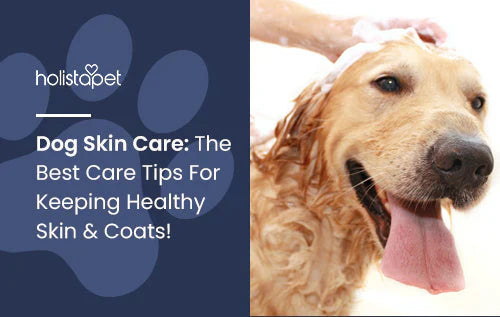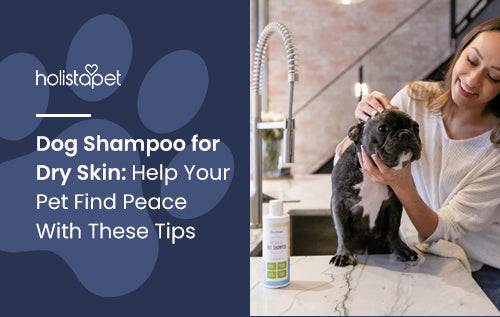Do you know the most common reason people bring their dog to the vet? Skin conditions. Yup, canine skin problems account for a large percentage of vet visits in the US. So, dog skincare is more important than you might realize!
You can do everything right with grooming and washing, but sometimes the weather or an allergic reaction can cause uncomfortable skin issues for your dog. Over-grooming or excessive scratching may be signs your dog is suffering from a skin condition. Fortunately, there are a few things you can do to help prevent and treat your dog's skin conditions.
This guide will help you identify potential signs and the causes of any skin problems your dog may have. Additionally, we'll discuss some steps you can take to ensure your dog is living healthy and happy.
Why Is It Important to Care for Your Dog's Skin?
Skincare is essential for your dog because having dry, itchy, or irritated skin can be extremely uncomfortable and, in some cases, painful for them. Skin is the largest organ on your dog's body. It protects them from bacteria and weather, regulates body temperature, and more. Skin is one of the most important organs in the body but can also be one of the most vulnerable.
Not only does healthy skin make a happier dog, but having a clean, soft pup makes for better cuddles! Healthy skin contributes to a shinier coat and less hair loss. Playing or cuddling with a dog that has flaky, scaly skin can is uncomfortable for all parties involved.
What Happens if You Neglect Caring for Your Dog's Skin?
If you don't pay attention to your dog's skin, small problems can grow and become more uncomfortable (and expensive to treat). It's best if you establish a consistent grooming routine and frequently check your dog's skin and coat for any problems. Neglecting their skincare can lead to several issues and extreme discomfort. This irritation can cause your dog to bark excessively or engage in other destructive behaviors out of pain.
Common Skin Problems in Dogs
"Skin condition" is a vague term to describe any number of issues. Sometimes finding out the exact cause of the issue can be difficult. It is important to wash your dog regularly (or as needed, depending on the breed) to prevent skin issues.
You can treat the more common dog skin problems at home. However, more severe conditions like ringworm or mange should be left to a trusted veterinarian. Here are some of the most common skin issues in dogs:

Allergies
Just like people, dogs can have allergic reactions to various things. Allergies can be triggered by anything from foods to bath products, grass, pollen, or medications. Common symptoms of allergies of include hives, itching, vomiting, diarrhea, and swelling.
Dermatitis
Dermatitis is general skin irritation that can occur from nutritional deficiency (nutritional dermatitis), environmental triggers (environmental dermatitis), or moisture trapped in the coat (moist dermatitis). It's essential to treat affected areas immediately since they are at increased risk of infection. If left untreated, hot spots may occur. These are large, inflamed areas that may also bleed and ooze. Very painful (and gross)!
Hives
Hives are a more severe form of skin irritation that appears as red, itchy bumps, and swelling. This condition usually results from an allergic reaction. Depending on the severity, a vet may need to apply antihistamine medicine to reduce swelling. Otherwise, specialized shampoos can help rinse the allergen away.
Parasites
Parasites such as ticks, fleas, or other insects can irritate your dog's skin. Irritations can cause your dog to scratch or claw themselves excessively, making the skin worse. Specialized shampoos or other skincare products can help get rid of these parasites.
Cuts and Scrapes
Dogs can get small cuts when they are playing or running around outside. Even if they are small, you should treat and clean these injuries to avoid infections.
Dry Skin
Dry skin is not usually painful, but it can be uncomfortable for your dog. When your dog has dry skin, you'll often notice flakes of skin trapped in their coats. Dry skin is usually a result of environmental factors like humidity, dehydration, or nutritional deficiency.
Seborrhea
Seborrhea is a genetic skin condition that causes oily, flaky skin. You may need antibiotics or medicated shampoos to treat this skin condition. A foul odor may also accompany seborrhea. It's best to bring your dog to the vet for appropriate treatment if they have this condition.
When Should I Be Concerned About My Dog's Skin?
You should always be concerned about your dog's skin and coat health! But more specifically, you should take extra care measures if you notice them scratching or grooming themselves more than normal. This is a sign that your four-legged friend is uncomfortable and trying to solve the problem on their own (which, unfortunately, makes it worse in almost all cases).
The best way to avoid any problems is to make sure that you are cleaning and grooming regularly. In addition to keeping your dog clean, it gives you plenty of chances to inspect their skin.
Still, it is not uncommon for dogs to get skin issues, so there is no need to worry as long as you seek treatment in time. Here are some signs your dog may be experiencing skin issues:
- Excessive licking, biting, clawing at the skin
- Rashes or redness
- Hair loss
- Dry, itchy skin or dandruff
- Bumps, pimples, or lesions
- Bleeding or scabs
You can detect some of these signs just by petting your dog and running your fingers through their coat. You can also do a closer inspection by brushing or separating their fur. Remember also to check their paws and ears — two areas that are also susceptible to infections!

How to Take Care of Your Dog's Skin
By giving your dog a proper diet, grooming routine, and clean space, you can significantly reduce the chance of them developing any skin conditions. Like all important things in life, consistency is key. You should maintain the routine for your dog's entire lifespan. For specific breed advice and care tips, consult a vet so they can give you the most accurate information for your dog.
Healthy Diet
Nutritious foods with an abundance of vitamins and minerals contribute immensely to your dog's health. The nutrients in healthy foods nourish your dog's skin and coat, leaving them looking robust and glowing. A lack of nutrients can cause your dog to lose fur and develop scaly skin.
A great new product that many pet owners have started using to support their dog's skin is CBD. CBD, or cannabidiol, is a compound derived from hemp. It can provide many benefits to your canine companion, including:
- Better sleep
- Improved mood
- Balanced appetite
- Calming and soothing effects
- Relief from muscle and skin discomfort
CBD products also contain many natural ingredients that can nourish your dog's skin. Our excellent CBD oil for dogs, CBD capsules, and CBD dog treats contain hemp seed, a superfood with extremely high nutritional value. Hemp seeds are an excellent source of essential fatty acids with high amounts of vitamins and minerals, such as vitamin E, potassium, sodium, calcium, zinc.
Not only do these nutrients play a large role in supporting skin health, but when combined with CBD, they can help your dog feel more comfortable in their skin!
Proper Grooming
When you brush or wash your dog, check their skin for any dryness, scabs, or inflammation. Consistent grooming can help you detect any fleas or skin conditions that need prompt treatment.
Dogs with skin folds are more prone to dermatitis or skin irritations because moisture can easily get trapped between the folds. Try to wipe down their skin every couple of days to clean out dirt and sweat buildup. Dogs that love to play outside or go swimming should be checked more often.
When you are grooming your dog, make sure to use only dog-safe products. Dogs and humans have different skin pH levels, so never use your shower or bath products made for people. There are many great medicated or moisturizing shampoos out there that can improve your dog's skin.
One of our most popular HolistaPet products is our CBD dog shampoo. Our shampoo is formulated with sensitive skin in mind and is suitable for every dog breed. It's refreshing, and the cleansing Mandarin berry scent makes your dog smell like a million bucks!
2
Protect Them From External Parasites
Parasites are a common issue with pets, but there are a few steps you can take to reduce the chances of your dog catching fleas or ticks. In addition to regular grooming, there are flea prevention and control products that you can use to fight these pests. Fleas typically prefer warmer climates and temperatures, but you should do prevention year-round no matter where you live to prevent any chance of infestation.
Your dog can catch fleas if they play outside every day. Wipe your dog down as necessary to keep them as clean as possible, especially if they like rolling in the dirt. Also, try to avoid contact with wild or homeless animals to prevent catching fleas or other diseases.
Ensure Their Environment is Clean
Keeping your dog clean is futile if your home or apartment is dirty. Try to keep their living environment as clean as possible to prevent dust or dirt from collecting and eventually getting trapped in your dog's coat. Fleas can significantly affect both you and your dog's comfort and health.
All it takes is one flea to enter your house to start laying eggs, and then you have an infestation on your hands. The best way to minimize the chance of a parasite invasion is to sweep your floors and vacuum the carpets at least once a week.
If you want extra protection, you can buy flea prevention spray for your yard. The spray can protect the yard and keep it free of parasites for both your dog and any children that play outside.

Final Thoughts - Dog Skin Care
With time and consistency, you can quickly improve your dog's coat and skin health and promote a healthier lifestyle overall. The key is to be thorough and not slack on checking for skin problems. After all, we all want our furry buddies to stick with us as long as possible in the best condition!
Read Next: DOG RASH ON BELLY [CAUSES, PREVENTION & REMEDIES FOR ITCH RELIEF]


 CBD Oil for Dogs - Fast Acting
CBD Oil for Dogs - Fast Acting
 Chicken Flavored CBD Oil For Dogs - Easy Dose
Chicken Flavored CBD Oil For Dogs - Easy Dose
 Salmon Flavored CBD Oil For Dogs - Highly Rated
Salmon Flavored CBD Oil For Dogs - Highly Rated
 CBG Oil for Dogs and Cats - Loved by Thousands
CBG Oil for Dogs and Cats - Loved by Thousands





Leave a comment
All comments are moderated before being published.
This site is protected by hCaptcha and the hCaptcha Privacy Policy and Terms of Service apply.